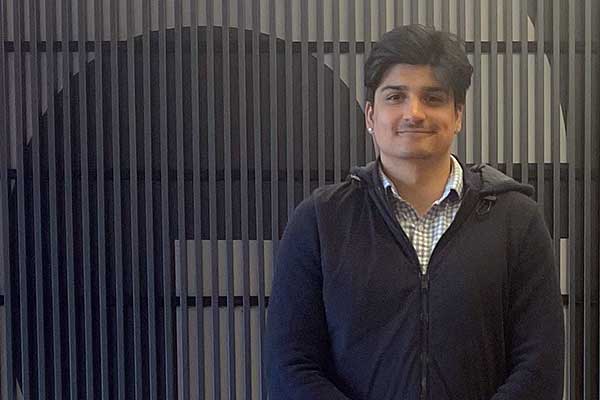Goldwater Scholar Works at the Intersection of Computers, Data, and Medicine

Siddharth Simon, E’24, computer engineering and computer science, is a pre-med student driven to use computer software and data engineering to make an impact in medicine, improving access to care as well as patient outcomes. This, along with his near-constant involvement in research, helped earn him a 2023 Barry Goldwater Scholarship, one of the nation’s most prestigious merit-based awards for undergraduate students planning to pursue research careers in natural sciences, engineering, and mathematics.
Simon is grateful for the award, sharing that “For me personally, it’s nice to get affirmed that I am doing alright.”
Researching the Brain
Since his first year at Northeastern, Simon has immersed himself in research at the intersection of computing, data, and medicine, starting in the Brain Stimulation and Simulation Lab of Sumientra Rampersa, visiting assistant research professor of electrical and computer engineering. In this work, Simon explored artificial intelligence, electricity, and magnetism in physics and neuroscience by studying the effects of head model precision on electric field simulation for non-invasive neurostimulation. His project, “Quantifying Effects of Model Edits on Neurostimulation Simulations,” measured the electric field differences between different brain simulation models to better understand the detail needed in tissue identification, and the potential errors caused by the mischaracterization of tissue types. The work earned him a PEAK Experiences Ascent Award in the fall of 2020.
Pursuing a growing interest in brain research, Simon went on to work at an internship in the Brain Modulation Lab at Massachusetts General Hospital (MGH) and Harvard Medical School. There, as a data engineer, he gathered information generated by implanted seizure-preventing devices called responsive neurostimulators and processed it for use by researchers and machine learning models.
“That amount of data is pretty unprecedented,” Simon says, noting that the devices collect EEG data constantly from the brains of thousands of users. “I was lucky to have a computer science and computer engineering background. I was able to just drop in and start helping quickly.”
Simon remains involved in research at MGH, where he is now working on a project led by a plastic and reconstructive surgeon to develop artificial intelligence as a diagnostic tool for headache disorders. Serving as the lead machine learning engineer and co-lead of software development on the project, he focuses on optimizing a machine learning algorithm used by a mobile application for diagnosis of migraines. Patients use the app to describe their symptoms, Simon explains, and the app helps determine the nerves involved and the type of specialist who might help.
“I’m excited,” he says. “I’ve never been on a project with this level of responsibility before.”
Robotics for Surgery and Drug Development
Simon’s co-op experiences have also broadened his skills in medical technology, particularly in robotics. His first co-op took place in the surgical robotics division of global medical device company Medtronic. There, he leveraged his computing abilities to help developers comply with FDA regulations by hunting for cybersecurity vulnerabilities and other bugs in the software libraries used by their devices.
Now in his second co-op job, Simon has joined a smaller enterprise, a biomedical startup called Generate Biomedicines. There, he serves as an automation engineer, working with bioinformatics data and robotic lab systems on high-throughput antibody production. The robotics, combined with machine learning capabilities, he explains, enable the small company to assemble customized proteins with specific therapeutic functions for biomedical industry clients, greatly accelerating drug development.
“The concept of designing these proteins can really be taken far,” he notes, with possible applications everywhere from energy production to waste management.
Making an Impact Where it’s Needed Most
While Simon sees medical school clearly in his future, he is eager to apply for a Fulbright Scholarship to travel to a developing country once he receives his undergraduate degree. He is already in contact with a clinic in Zambia, where he hopes to apply his computing skills in a medical context yet again, this time in a location with profound need.
“I would go there to help improve—in some cases create—their health data infrastructure,” he says, “so when a patient goes into a clinic, the physician has some information beforehand. It would save a lot of time for them and hopefully improve quality of care.”
Related Story: Meet the three Northeastern students awarded Goldwater Scholarships this year